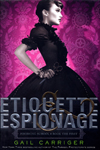
Nonfiction Graphic Novels Are Helping Students Learn.
An article on the Publisher’s Weekly web
page provides some food for thought about the value of nonfiction graphic novels, especially for reluctant readers. A well-written, well-illustrated nonfiction graphic novel will involve more of the brain that text only does. Referring to a study by the University of Oklahoma, the author notes that college students read either an excerpt from a standard textbook or one from a graphic novel covering the same information. Both groups did equally well on the quiz. Some commenters noted that the army has known this for years, as Will Eisner wrote the comic version training manuals for tank repair and other topics during World War II. They also address the rather oxymoronic category name in the comments section. It does seem strange to call them “nonfiction graphic novels.” Perhaps a better term will come along.
 Etiquette & Espionage
Etiquette & Espionage by Gail Carriger is the first book in her new series aimed at teens, call “Finishing School.” Set in the same world as her “Parasol Protectorate” series but in a slightly earlier time period, we meet Sophronia, 14, who is always in the midst of kerfuffles and disturbances. Her latest stunt has landed her in a finishing school. But, while she does learn a proper curtsy, dancing and other expected things, she is also learning eavesdropping and diversion. She is soon investigating (on her own) the location of a vital, missing item. Could she have found her proper place?
(The Nebraska Library Commission receives free copies of children’s and young adult books for review from a number of publishers. After review, the books are distributed free, via the Regional Library Systems, to Nebraska school and public libraries.)
 Nonfiction Graphic Novels Are Helping Students Learn.
An article on the Publisher’s Weekly web page provides some food for thought about the value of nonfiction graphic novels, especially for reluctant readers. A well-written, well-illustrated nonfiction graphic novel will involve more of the brain that text only does. Referring to a study by the University of Oklahoma, the author notes that college students read either an excerpt from a standard textbook or one from a graphic novel covering the same information. Both groups did equally well on the quiz. Some commenters noted that the army has known this for years, as Will Eisner wrote the comic version training manuals for tank repair and other topics during World War II. They also address the rather oxymoronic category name in the comments section. It does seem strange to call them “nonfiction graphic novels.” Perhaps a better term will come along.
Nonfiction Graphic Novels Are Helping Students Learn.
An article on the Publisher’s Weekly web page provides some food for thought about the value of nonfiction graphic novels, especially for reluctant readers. A well-written, well-illustrated nonfiction graphic novel will involve more of the brain that text only does. Referring to a study by the University of Oklahoma, the author notes that college students read either an excerpt from a standard textbook or one from a graphic novel covering the same information. Both groups did equally well on the quiz. Some commenters noted that the army has known this for years, as Will Eisner wrote the comic version training manuals for tank repair and other topics during World War II. They also address the rather oxymoronic category name in the comments section. It does seem strange to call them “nonfiction graphic novels.” Perhaps a better term will come along.
 Etiquette & Espionage by Gail Carriger is the first book in her new series aimed at teens, call “Finishing School.” Set in the same world as her “Parasol Protectorate” series but in a slightly earlier time period, we meet Sophronia, 14, who is always in the midst of kerfuffles and disturbances. Her latest stunt has landed her in a finishing school. But, while she does learn a proper curtsy, dancing and other expected things, she is also learning eavesdropping and diversion. She is soon investigating (on her own) the location of a vital, missing item. Could she have found her proper place?
(The Nebraska Library Commission receives free copies of children’s and young adult books for review from a number of publishers. After review, the books are distributed free, via the Regional Library Systems, to Nebraska school and public libraries.)
Etiquette & Espionage by Gail Carriger is the first book in her new series aimed at teens, call “Finishing School.” Set in the same world as her “Parasol Protectorate” series but in a slightly earlier time period, we meet Sophronia, 14, who is always in the midst of kerfuffles and disturbances. Her latest stunt has landed her in a finishing school. But, while she does learn a proper curtsy, dancing and other expected things, she is also learning eavesdropping and diversion. She is soon investigating (on her own) the location of a vital, missing item. Could she have found her proper place?
(The Nebraska Library Commission receives free copies of children’s and young adult books for review from a number of publishers. After review, the books are distributed free, via the Regional Library Systems, to Nebraska school and public libraries.) 
